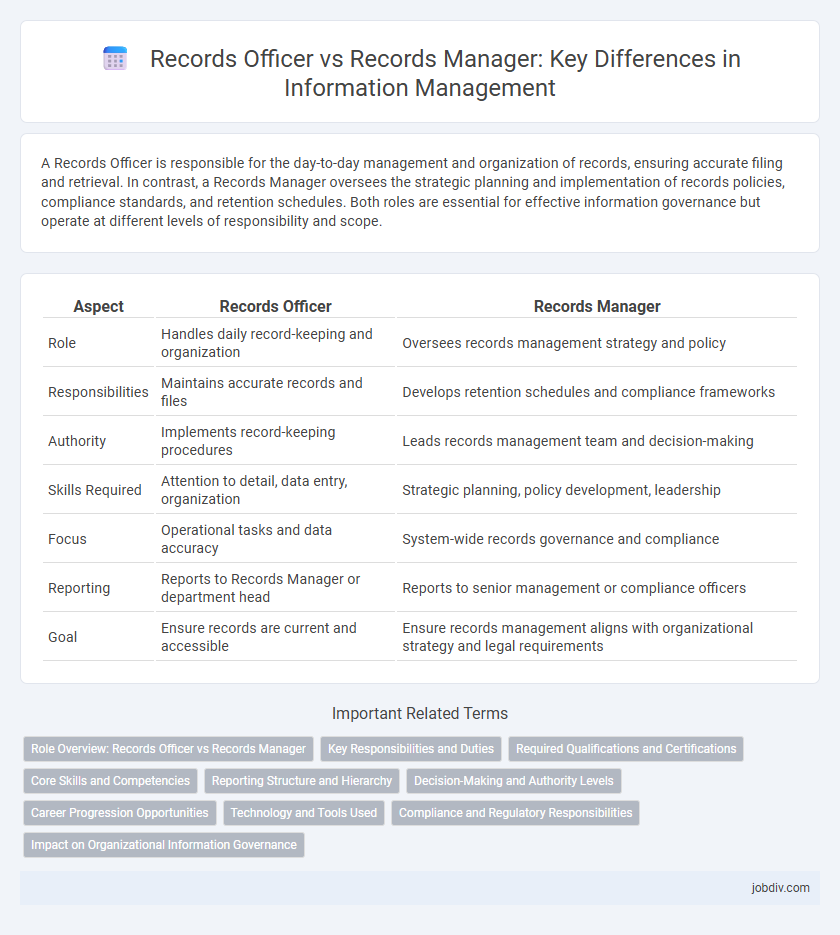A Records Officer is responsible for the day-to-day management and organization of records, ensuring accurate filing and retrieval. In contrast, a Records Manager oversees the strategic planning and implementation of records policies, compliance standards, and retention schedules. Both roles are essential for effective information governance but operate at different levels of responsibility and scope.
Table of Comparison
| Aspect | Records Officer | Records Manager |
|---|---|---|
| Role | Handles daily record-keeping and organization | Oversees records management strategy and policy |
| Responsibilities | Maintains accurate records and files | Develops retention schedules and compliance frameworks |
| Authority | Implements record-keeping procedures | Leads records management team and decision-making |
| Skills Required | Attention to detail, data entry, organization | Strategic planning, policy development, leadership |
| Focus | Operational tasks and data accuracy | System-wide records governance and compliance |
| Reporting | Reports to Records Manager or department head | Reports to senior management or compliance officers |
| Goal | Ensure records are current and accessible | Ensure records management aligns with organizational strategy and legal requirements |
Role Overview: Records Officer vs Records Manager
A Records Officer is responsible for the accurate classification, maintenance, and retrieval of organizational records, ensuring compliance with data management policies. In contrast, a Records Manager oversees the development and implementation of records management strategies, policies, and systems to optimize information governance across the organization. Both roles emphasize information integrity, but the Records Manager operates at a strategic level while the Records Officer handles operational tasks.
Key Responsibilities and Duties
Records Officers primarily focus on the accurate classification, maintenance, and retrieval of organizational records, ensuring compliance with legal and regulatory requirements. Records Managers oversee the entire records management program, including policy development, strategic planning, and staff supervision to optimize information lifecycle and secure data management. Both roles are essential for maintaining data integrity, but Records Managers hold broader responsibilities encompassing governance and process improvement.
Required Qualifications and Certifications
Records Officers typically require a diploma or associate degree in records management or information science, with certifications such as the Certified Records Manager (CRM) or Information Governance Professional (IGP) enhancing their qualifications. Records Managers generally hold a bachelor's degree or higher in library science, information management, or business administration, often requiring advanced certifications like the Certified Records Analyst (CRA) or Certified Information Professional (CIP) to demonstrate expertise in strategic records management. Both roles demand strong knowledge of compliance standards, data protection regulations, and best practices in digital and physical records handling.
Core Skills and Competencies
Records Officers demonstrate expertise in organizing, maintaining, and retrieving records with strong attention to detail and adherence to compliance standards. Records Managers possess advanced skills in strategic records management, policy development, and team leadership to ensure effective information governance across the organization. Both roles require proficiency in digital records systems, data security, and regulatory knowledge, but Records Managers emphasize decision-making and process optimization competencies.
Reporting Structure and Hierarchy
A Records Officer typically reports to a Records Manager, who oversees the entire records management function within an organization. The Records Manager holds a higher hierarchical position, responsible for strategic planning, policy development, and compliance monitoring. This reporting structure ensures clear accountability and efficient flow of information between operational and managerial levels in records management.
Decision-Making and Authority Levels
Records Officers typically handle day-to-day record-keeping tasks with limited decision-making authority, ensuring accurate documentation and adherence to organizational policies. Records Managers possess higher authority levels, responsible for strategic decision-making, policy development, and overseeing the entire records management lifecycle. The distinction in authority impacts how records are controlled, with managers setting frameworks that officers implement operationally.
Career Progression Opportunities
A Records Officer primarily handles the day-to-day management and organization of records, ensuring accurate documentation and compliance with regulatory requirements. Career progression from a Records Officer often leads to a Records Manager role, which involves strategic planning, policy development, and overseeing the entire records management system within an organization. Records Managers typically advance to senior positions such as Information Governance Manager or Chief Records Officer, reflecting increased responsibilities in information lifecycle management and organizational data governance.
Technology and Tools Used
Records Officers primarily utilize electronic document management systems (EDMS) and basic database software to handle daily record-keeping tasks, ensuring accurate data entry and retrieval. Records Managers employ advanced information governance platforms, including automated classification tools, retention scheduling software, and compliance monitoring systems, to oversee policy implementation and strategic record lifecycle management. Both roles increasingly leverage cloud-based storage solutions and artificial intelligence-powered analytics for enhanced efficiency and data integrity.
Compliance and Regulatory Responsibilities
Records Officers ensure accurate documentation and maintenance of records in compliance with legal and regulatory standards, focusing on daily adherence to established policies. Records Managers develop and implement comprehensive records management programs, overseeing compliance with data protection laws and industry-specific regulations to mitigate risks. Their responsibilities include conducting audits, training staff on regulatory requirements, and updating procedures to align with evolving compliance mandates.
Impact on Organizational Information Governance
Records Officers ensure accurate documentation and compliance by managing day-to-day records activities, which directly supports the organization's information governance framework. Records Managers develop and implement policies and strategies that oversee the lifecycle of records, enhancing data integrity and regulatory adherence across the enterprise. Strong collaboration between Records Officers and Records Managers improves organizational accountability and risk management in information governance.
Records Officer vs Records Manager Infographic

 jobdiv.com
jobdiv.com